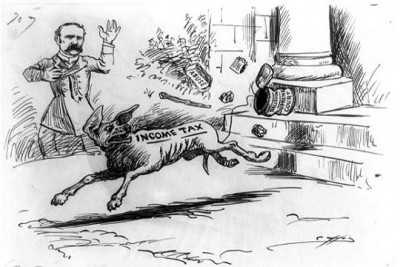In the weeks before the European parliamentary elections, the issue of fiscal harmonization across the European Union was again in the spotlight. Most political parties tackle tax evasion in their manifestos, and some even support fiscal harmonization as a way to prevent it.
As we might expect, residents of high-tax countries often shift their assets to countries with lower taxes, resulting in capital outflows from the first group. Indeed, companies and individuals are constantly finding new ways to avoid high taxes, as evident for example by the recent “inversions” of U.S. companies, that is, the moving of headquarters overseas to lower the tax burden. Naturally, this is a thorn in the side of politicians, and they might be inclined to adopt strategies to prevent it.
Fiscal harmonization is the homogenizing of countries’ tax systems, whether by natural occurrence (through fiscal competition) or political negotiation. But is fiscal harmonization a credible goal, and if so, who would benefit? Possible answers to these questions were delivered by Professor Enrico Colombatto in his 2012 paper, “Fiscal Harmonization: Credible Goal or Trojan Horse?” (PDF).
According to Colombatto, the attitudes of policymakers toward fiscal competition and harmonization can differ depending on the context. On the one hand, strongly free-market countries, in which the tax pressure is low and politicians are constrained by concerns about legitimacy, are more likely to enjoy capital inflows and thus benefit by greater tax revenues and growth. Fiscal competition therefore should pose little or no difficulty.
On the other hand, in strongly communitarian societies with high taxation, the impact of fiscal competition might be lessened or prevented by the higher loyalty of taxpayers due to the greater emphasis on the social contract and effective monitoring of rent-seeking, the striving for political privilege.
It is weak countries, then, with high taxes and extensive rent-seeking that are most vulnerable to fiscal competition and thus most likely to favor preventive measures. They have number of strategies at their disposal. First, they could engage in a tax-cutting war. In the past year 24 countries have cut their corporate tax rates. (See KPMG International, “Corporate and Indirect Tax Rate Survey 2014.”) However, according to Colombatto, weak countries are unlikely to be able to sustain the resulting budget deficits with debt.
Second, they could opt for the automatic exchange of information about the financial assets of nonresidents or for withholding taxes on the income from capital. Arguably, these options might be more feasible for politicians, and they have frequently been debated and employed as the solution of choice during the past few years.
The final option, the one that constitutes the core of Colombatto’s analysis, is fiscal harmonization. While it can be argued that harmonization would generate some tax revenues by reducing fiscal competition and by moving the tax authorities further away from the electorate (making it possible to squeeze the taxpayers even more), it is also accompanied by some significant drawbacks.
First, even though by colluding with others, a high-tax country might be able to protect itself from fiscal competition in the harmonized area, it is by no means protected from countries outside the area. Furthermore, because fiscal harmonization might be just a step toward fiscal centralization, local politicians might be unwilling to see their power and authority shifted to federal bureaucrats (who could also soon develop an appetite for spending). Therefore, if the other options (exchange of information on nonresidents and tax withholding on capital incomes) appear superior to fiscal harmonization, it is hard to imagine that rational politicians would support it.
Colombatto argues that local politicians are not the driving force for harmonization as a solution to decreasing tax revenues. Rather, it is the international organizations, which see harmonization as a step toward the fiscal unification and centralization that would either further justify their existence (if they function as a monitoring authority like OECD), or would serve to extend their power (if they have policymaking powers such as the European Union).
Colombatto’s discussion puts fiscal harmonization into new perspective — one worth considering in light of the recent parliamentary elections.
I would like to thank for editing to Alexander Skouras and Emmanuel Martin.



















No comments
Be the first one to leave a comment.